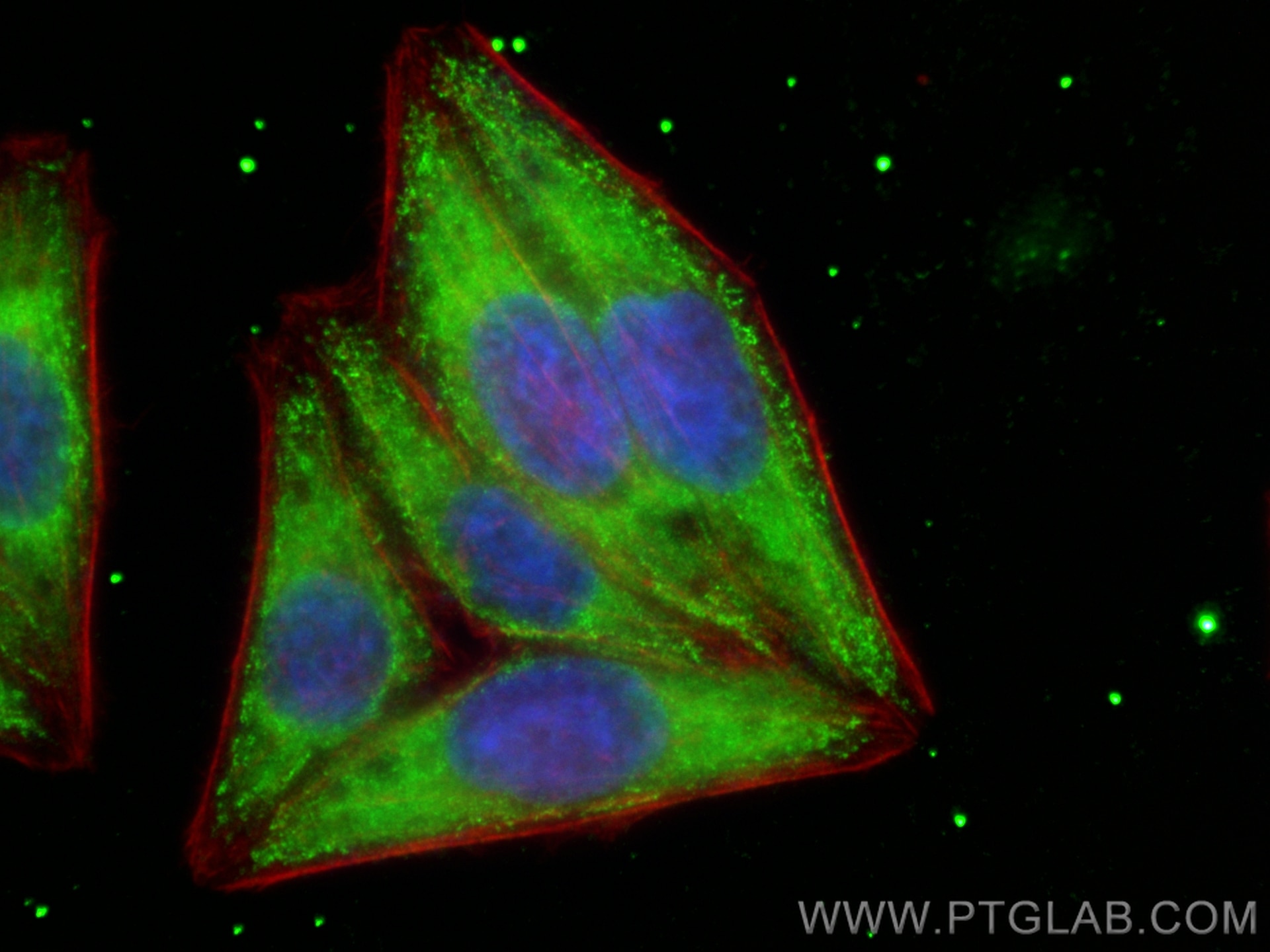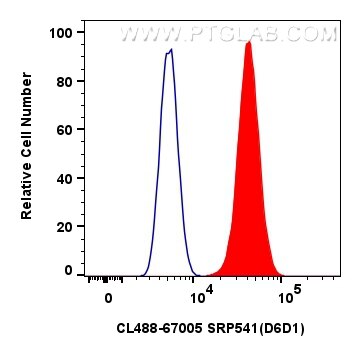Validation Data Gallery
Tested Applications
| Positive IF/ICC detected in | HepG2 cells |
| Positive FC (Intra) detected in | HeLa cells |
Recommended dilution
| Application | Dilution |
|---|---|
| Immunofluorescence (IF)/ICC | IF/ICC : 1:50-1:500 |
| Flow Cytometry (FC) (INTRA) | FC (INTRA) : 0.40 ug per 10^6 cells in a 100 µl suspension |
| It is recommended that this reagent should be titrated in each testing system to obtain optimal results. | |
| Sample-dependent, Check data in validation data gallery. | |
Product Information
CL488-67005 targets SRP54 in IF/ICC, FC (Intra) applications and shows reactivity with human, mouse, rat samples.
| Tested Reactivity | human, mouse, rat |
| Host / Isotype | Mouse / IgG1 |
| Class | Monoclonal |
| Type | Antibody |
| Immunogen |
CatNo: Ag12166 Product name: Recombinant human SRP54 protein Source: e coli.-derived, PET28a Tag: 6*His Domain: 167-505 aa of BC003389 Sequence: DPVIIASEGVEKFKNENFEIIIVDTSGRHKQEDSLFEEMLQVANAIQPDNIVYVMDASIGQACEAQAKAFKDKVDVASVIVTKLDGHAKGGGALSAVAATKSPIIFIGTGEHIDDFEPFKTQPFISKLLGMGDIEGLIDKVNELKLDDNEALIEKLKHGQFTLRDMYEQFQNIMKMGPFSQILGMIPGFGTDFMSKGNEQESMARLKKLMTIMDSMNDQELDSTDGAKVFSKQPGRIQRVARGSGVSTRDVQELLTQYTKFAQMVKKMGGIKGLFKGGDMSKNVSQSQMAKLNQQMAKMMDPRVLHHMGGMAGLQSMMRQFQQGAAGNMKGMMGFNNM 相同性解析による交差性が予測される生物種 |
| Full Name | signal recognition particle 54kDa |
| Calculated molecular weight | 54 kDa |
| Observed molecular weight | 54 kDa |
| GenBank accession number | BC003389 |
| Gene Symbol | SRP54 |
| Gene ID (NCBI) | 6729 |
| RRID | AB_3672934 |
| Conjugate | CoraLite® Plus 488 Fluorescent Dye |
| Excitation/Emission maxima wavelengths | 493 nm / 522 nm |
| Form | |
| Form | Liquid |
| Purification Method | Protein G purification |
| UNIPROT ID | P61011 |
| Storage Buffer | PBS with 50% glycerol, 0.05% Proclin300, 0.5% BSA{{ptg:BufferTemp}}7.3 |
| Storage Conditions | Store at -20°C. Avoid exposure to light. Stable for one year after shipment. Aliquoting is unnecessary for -20oC storage. |
Background Information
The signal recognition particle (SRP) is a ribonucleoprotein complex that mediates the targeting of proteins to the endoplasmic reticulum (ER). The complex consists of a 7S (or 7SL) RNA and 6 different proteins, and signal recognition particle 54 (SRP54) is one of them. SRP54 binds to the signal sequence of presecretory protein as they emerge from the translating ribosomes, and then transfers them to translocating chain-associating membrane protein (TRAM).
Protocols
| Product Specific Protocols | |
|---|---|
| FC protocol for CL Plus 488 SRP54 antibody CL488-67005 | Download protocol |
| IF protocol for CL Plus 488 SRP54 antibody CL488-67005 | Download protocol |
| Standard Protocols | |
|---|---|
| Click here to view our Standard Protocols |


